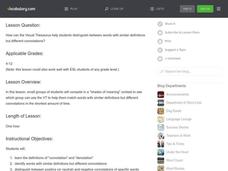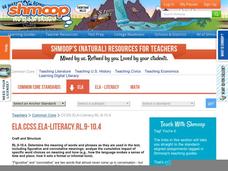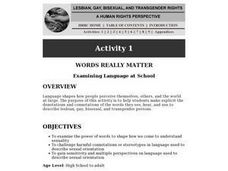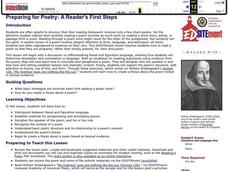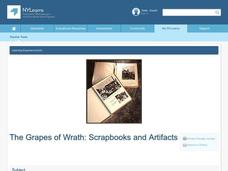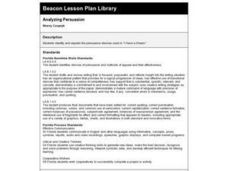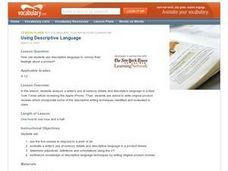EngageNY
Finding Evidence of Laurence Yep’s Perspective of the Police in Dragonwings
Perspective is everything. Using a graphic organizer, pupils determine Laurence Yep's perspective of the police in his novel Dragonwings. Additionally, scholars complete anchor charts to identify connotative language in the text.
Curated OER
Understanding Connotation
Lincoln's "Gettysburg Address," which is available online, is used in the language lesson presented here. Middle schoolers read through the text for comprehension. Then, they reread the first paragraph and identify all the words with...
Curated OER
"Shooting an Elephant"
Study selected vocabulary terms in George Orwell's "Shooting an Elephant." A chart includes five selections, and learners must record the connotative and denotative meaning for each. A great look at using the context to define vocabulary...
Curated OER
Shades of Meaning
Students use words with similar meanings to analyze implied meanings. In this word connotation lesson, the teacher introduces the activity by asking students whether a new product should be advertised as "newfangled" or "cutting-edge." ...
Scholastic
Hold the Presses!: Revising for Connotation
Middle schoolers discuss the meaning of the sentence, The student asked to go to the office." Ask the class if the sentence gives the reader any information about the student. Can they visualize the way the student asked the question?...
Encyclopedia Britannica
Candidate Flip-Flop or Evolution?
Beware political rhetoric! Connotation is everything! Groups select a presidential candidate and investigate how the candidate's position has changed on a specific issue. After analyzing the situation, the group determines whether they...
K20 LEARN
Things Are Lit at Thornfield: Jane Eyre
Jane Eyre offers scholars an opportunity to practice reading comprehension skills. Pairs are assigned a word from the text, use their prior knowledge, and consider the context, connotation, and denotation of the word to posit a...
Curated OER
An Introduction to Of Mice and Men
By collaborating on producing a product ad and slogan, learning partners demonstrate their understanding of the difference between connotative and denotative language. This week-long activity is designed to be used as an introduction to...
Curated OER
Identify Text Features in Nonfiction
What does a non-fiction text look like? Examine the text features of non-fiction. Middle and high schoolers read non-fiction passages provided by their instructor and analyze the texts for word choice, details, and organization.
Anti-Defamation League
Intent vs. Impact: Why Does it Matter?
Contrary to the popular saying, words can hurt. Words matter! Tweens and teens can reflect on how words impact others even if the intent wasn't how the words were perceived. After examining an Instagram post where Lizzo apologized for...
Shmoop
ELA.CCSS.ELA-Literacy.RL.9-10.4
The fourth standard for reading literature in the Common Core calls for young readers to be able to determine the figurative and connotative meanings of words and phrases. Use this resource, a continuation of a series of Common Core...
Curated OER
Words Really Matter: Examining Language at School
Help your students gain sensitivity and become aware of the implications of the words they see, hear, and use about lesbian, gay, bisexual, and transgender people. After making lists of words or phrases they hear or use in school...
Curated OER
Preparing for Poetry: A Reader's First Steps
Students examine denotation and connotation in language, and paraphrase a poem. They read and analyze a sonnet by iam Shakespeare, analyze the attitude and tone, paraphrase a poem, and create a thesis about a poem based on textual evidence.
Curated OER
Word Origins
Have you ever studied historical words and found that they were deeply rooted in racism or prejudice? Select a long list of these words to have your class examine. What familiar roots do they have? Do they know when this word originally...
Facing History and Ourselves
After Charlottesville: Contested History and the Fight against Bigotry
History doesn't always reflect all sides. Academics discover how the remembered history of the Civil War differs for White and African Americans. The lesson explores how Civil War monuments and celebrations have racist connotations for...
Curated OER
Speak Write! Understanding the Hidden Meaning of Words
Students investigate connotation and denotation as a basis for greater examining of language. They identify the literal meaning of words and explore the greater implications and impact of word usage.
Curated OER
The Grapes of Wrath: Scrapbooks and Artifacts
Students complete research to enhance their reading of "The Grapes of Wrath". Using the text, they identify and locate cultural artifacts and discuss their symbolic connotations. As a class, they create a museum exhibit of the various...
Curated OER
Close Reading
Eleventh graders read and study Hamlet. Then they are introduced to close reading as a means of understanding what is being read--not only understanding the printed word, but also the nuances and connotations of language as it is used by...
Novelinks
The Little Prince: Brainstorming Activity
What do you think of when you hear the word adult? Or friend? Learners brainstorm with a group of peers to list the words they think of when they hear seven words from Antoine de Saint-Exupéry's The Little Prince.
Prestwick House
"Because I could not stop for Death" -- Visualizing Meaning and Tone
Emily Dickinson's "Because I could not stop for Death" provides high schoolers with an opportunity to practice their critical thinking skills. They examine the images, diction, rhythm, and rhyme scheme the poet uses and consider how...
Curated OER
Paper Clip Game for Learning the Value of Rules
Rules may carry a negative connotation with many adolescents, but this simulation activity reminds them of the importance of a fair and consistent set of laws. It's very simple: pupils are arranged in rows, with the first person in each...
Curated OER
What's So Bad or Good About Conflict?
Learners of all ages discuss how conflict can be negative and positive. First, they create a class bulletin board about conflict, and provide their thoughts and connotations surrounding the word. In a class discussion, they ask questions...
Curated OER
Analyzing Persuasion
A reading of Dr. Martin Luther King Jr.'s "I Have a Dream" speech launches a study of rhetorical devices such as hyperbole, allusion, metaphor, simile, personification, connotative language and parallel structure. Class members then...
Curated OER
Using Descriptive Language
Students examine the use of adjectives in a product review, then write their own descriptive review. In this writing and word usage lesson plan, students first analyze the choice of adjectives in a New York Times article about the...
Other popular searches
- Connotation and Denotation
- Connotation Worksheets
- Connotation Words
- Connotation Denotation
- Connotation vs. Denotation
- Poetry Connotation
- Connotation vs Denotation
- Word Connotations
- Connotations and Denotations
- Connotation, Denotation
- Connotations of Words
- Denotation and Connotations





